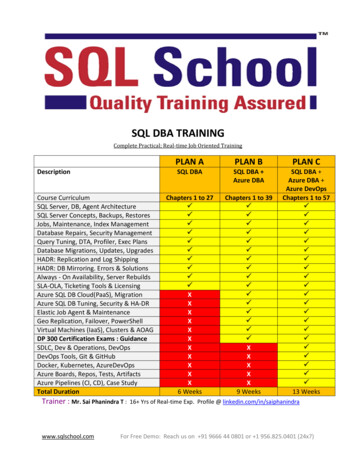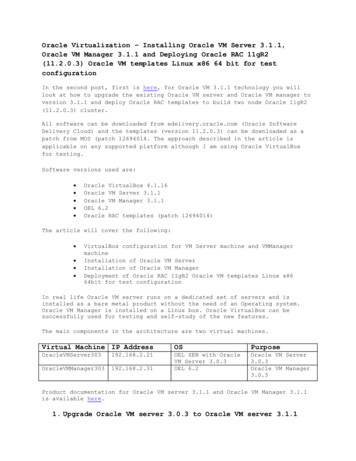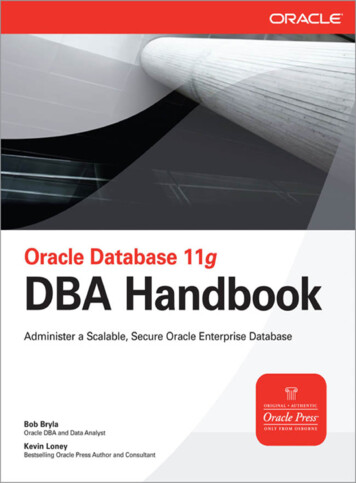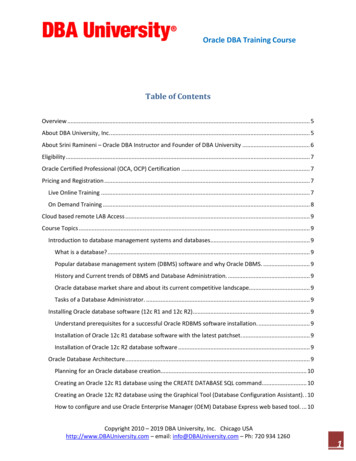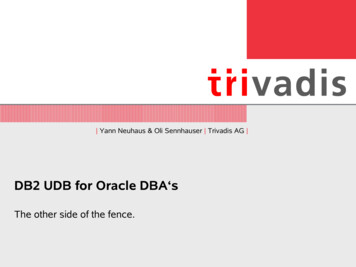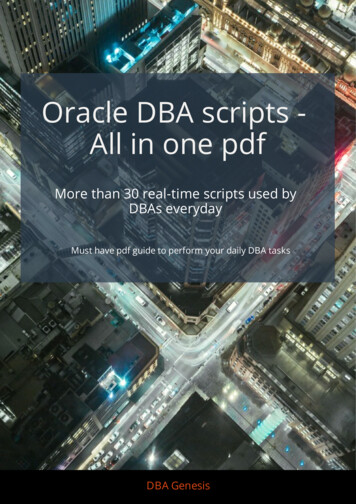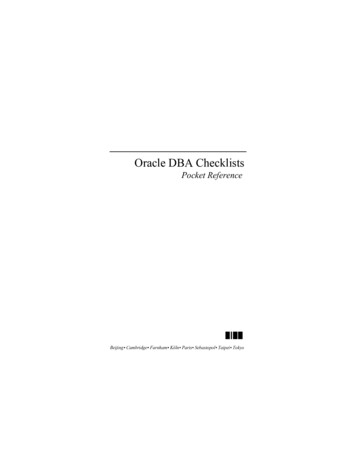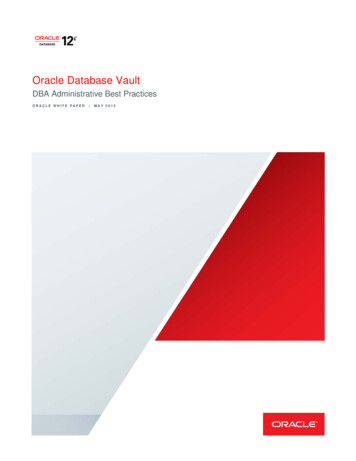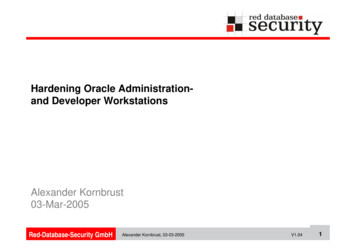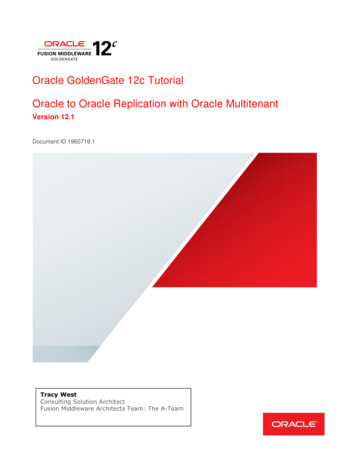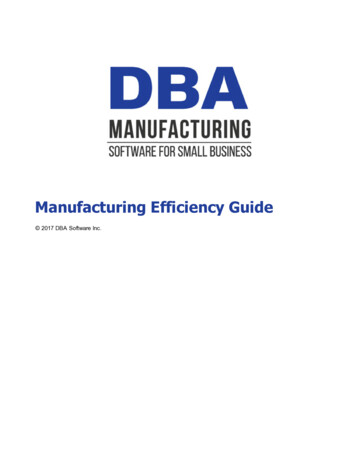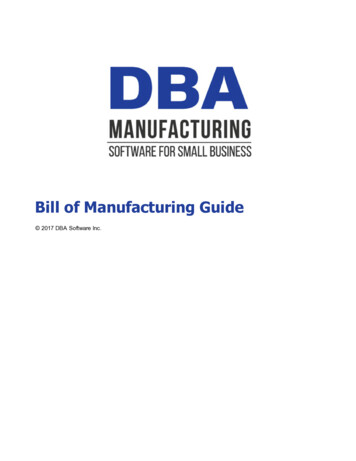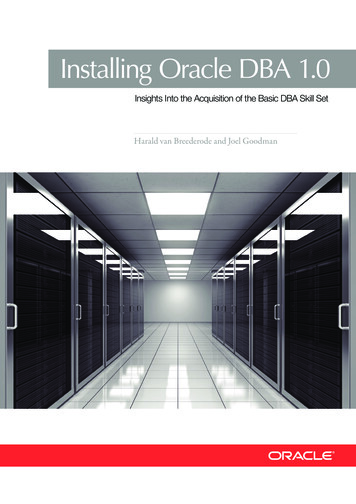
Transcription
Installing Oracle DBA 1.0Insights Into the Acquisition of the Basic DBA Skill SetHarald van Breederode and Joel Goodman
O R AC L E U N I V ER S I T YIntroductionIn 2008 we published a booklet discussing the skill-set required by many modern DBAswhich we called “Upgrading from Oracle DBA 1.0 to DBA 2.0”. We discussed some of theshifts in Oracle technology and the need for Oracle DBAs to move with the times by learning new skills previously thought to have been exclusively for administration of operatingsystems, storage systems or networks. The booklet was intended as a guide for experiencedOracle DBAs, but did not address basic skills required by entry level DBAs.We both began our Oracle DBA careers by switching to Oracle from other technology areasand we have been discussing how we did this, what skills were required or useful or both, andthe milestones that we set for ourselves along the way.iioracle.com /e ducation
O R AC L E U N I V ER S I T YInstalling Oracle DBA 1.0Harald van Breederode and Joel GoodmanInsights into the Acquisition of the Basic DBA Skill-Setoracle.com /e ducation1
O R AC L E U N I V ER S I T YHaraldMy first exposure to Oracle Databases was while working in the Dutch Oracle data centre between 1993 and 1998as a Unix systems administrator. In that role, I looked after many Unix systems that ran Oracle 6 and Oracle 7, but Iknew virtually nothing about Oracle technology at the time. In 1999 I joined Oracle University taking responsibility for Unix servers that were used to host Oracle University core technology courses. As part of my role, I inheritedthe “precourse” scripts that built Oracle courses in the classroom.At this time I began to attain some basic Oracle DBA skills required to create and maintain the classroom set-ups,but I realised straight away that Oracle was a complex piece of technology. As I already had useful OS, storage, andnetwork administrator skills, I was able to learn Oracle fairly quickly by a combination of self-study and courseattendance.Joel, how did you get started?JoelI was on a sabbatical year in 1993 and 1994, having spent 18 years in the industry as a specialist in Mainframetechnology, including seven years as a trainer. It seemed like a good idea to upgrade my skills to more modern technology. I therefore joined Oracle Customer Support to help customers running Oracle on mainframes, but my goalwas always to learn enough so that I could return to my favourite work as a trainer.Unlike you, I required more new skills at the time, as it was a big change moving from the mainframe support role(at the start) to a generic DBA role. I then supported many customers who ran Oracle on IBM MVS and VM, butthe trend toward Unix was already clear, as was the need to attain some basic VMS and Unix skills required at thetime to install and administer Oracle databases.Which skills did you acquire first when learning to be an Oracle DBA?HaraldThe first and most important skills I acquired were practical ones needed to work in the data centre, such as software installation, database creation, instance startup and shutdown, backup and recovery and some diagnosticsusing the alert log and trace fi les. To help me do this, I attended the basic SQL course and the DBA Admin coursefor Oracle at the time. This helped me understand the introductory skills needed for Oracle Database Administration, as well as the basic architecture of the Oracle background processes and memory structures, which was muchsimpler in those days.JoelIt is not surprising that you began with more of an ‘operational’ skill-set, given that you needed to maintain anddevelop the “pre-course” scripts, which performed many of these actions.HaraldYes, that is true - but the technology was still somewhat of a “black box” to me until I got motivated to learn itproperly. I was asked to fi ll in for another trainer and deliver a “Managing Oracle on Unix” course, and realised howlittle I knew about architectural details when I examined the course notes. It was this course that really motivatedme to move beyond the ‘operational’ skills and to become a proper DBA 1.0.You were already well known as an Oracle trainer in those days, but when you started - how did you decide whichskills to learn first?2oracle.com /e ducation
O R AC L E U N I V ER S I T YJoelAs a member of Oracle support I was required to handle service requests on any or all database topics when workingon level-1 support. In those days I was new so I worked on level-1 calls, while the more experienced support engineers handled level-2 for calls that level-1 people could not close quickly. So I was exposed to a wide range of OracleDBA bugs and problems. This was a very useful learning environment, as the problems I handled ranged acrossmany areas including: installation, configuration, backup and recovery, monitoring and tuning, the optimiser andseveral others. But I handled things only when the customer had ‘problems’, so my skills were heavily focused ondiagnostics, traces, alert logs, and the use of many undocumented features and support tools. My knowledge of thearchitecture was gained from a few courses that I attended in the first few weeks of the job and also from managingmany customer calls and examining the alert logs and traces that were used to aid the diagnosis.HaraldIt sounds like a very different approach than mine since you learned much of your skills from the ‘inside-out’ compared to the ‘outside-in’ approach that I took from the operating system into Oracle. You knew about internals,traces, memory structures and other low level processing, but I began with data fi les, processes, some memorystructures and other higher-level components. Of course developers have also got an ‘outside-in’ path starting fromthe programming interfaces to Oracle rather than from the OS - but this shows that prospective DBAs have several possible entry points into a career in Oracle DBA technology. There is no such thing as “The Best Way” to getstarted or to learn Oracle.JoelYes, this certainly reflects the different paths upon which Oracle DBAs travel in becoming a DBA. Many DBAsthat I have taught over the years began their Information Technology careers in computer operations, and to themOracle was also a “black box”. Some of my delegates began in development writing SQL and PL/SQL, and movedinto the DBA skill-set first by becoming a “Development DBA” and then a “Production DBA”. Some DBAs aretrained as DBAs from the start and like myself - may have learned from the ‘inside-out.’HaraldIt sounds to me as if the ‘inside-out’ approach might be a very good method since one gets a real in-depth understanding of the technology as compared to the ‘outside-in’ approach. I was writing and maintaining a suite ofautomated shell and perl scripts to clone databases and set up accounts for students on courses, but at the start - Ihad little idea of what was happening inside the Oracle kernel. In some cases, it took me quite some time to figureout how Oracle worked and why certain parts of the system did what they did.JoelThe ‘outside-in’ approach has advantages and disadvantages. I knew a very great deal about those parts of the Oracledatabase and the kernel for which I had experience in handling customer calls, producing reproducible cases, raising bug reports and related activities that one performs in support. But there were areas of Oracle database aboutwhich I knew little or nothing because I did not have experience in those areas.For example, after nearly two years in support I knew Database Links and Heterogeneous Service Agents (thencalled Transparent Gateways) in depth, but had no skills in (what was then known as) Parallel Server or in ParallelQuery as I did not have an opportunity to work on problems in those areas.In summary: DBAs who use this approach often have an incomplete and unbalanced skill-set and may be lackingskills in fundamental areas.oracle.com /e ducation3
O R AC L E U N I V ER S I T YHaraldWe have discussed the fundamental approaches to learning Oracle and perhaps other technology as well, but newDBAs may wish to know of any learning tricks and tips we can share. The Oracle database is a much larger productnow than when we began and it is crucial to help prospective DBAs to focus on the most important skills and thetechniques that assist learning.When I started learning Oracle database technology you were already known in the DBA training community asan expert and I recall attending some Oracle 8i Internals seminars that you gave in the Netherlands. How did yougain this expertise to teach internals in a relatively short time after leaving support with the incomplete skill-set towhich you referred?JoelI left support and joined Oracle University in 1997 once I had enough confidence in my basic skills to return totraining. My role required that I deliver the Oracle Database Tuning course and also the full range of basic coursesavailable at the time. There were only two advanced courses in those days: Parallel Server – which was the ClusteredDatabase product prior to RAC, and Replication – and my goal was to teach them as well. This requirement toteach others is what gave me the proper motivation to learn Oracle technology to a sufficient depth. I used varioustechniques to help me learn quickly having used these in my earlier career to the same effect.HaraldThat is indeed useful information, and reinforces what I said earlier about ‘teaching as the best way to learn’. Teaching and learning are really part of the same process and we both seem to agree on that, despite becoming Oracletrainers from different backgrounds and using different approaches.I became a full-time Oracle Trainer in 2000 and used a similar all-around approach. By learning all the courses Iattained a broad skill-set, and by writing demos and researching topics I further deepened my skills.But you had some very deep skills from the start, having got them in support how did they help you as a trainer?JoelSome of the skills that I used in support were not that important at first, such as using undocumented features towork around problems and bugs. But I was missing other skills as I mentioned.On my first day, I asked for copies of all the DBA courses - even though the expectation was that I should teachonly some of them at first. It took a long time to read all those courses, but this was not that dissimilar to readingseveral of the high-level books in the documentation set such as the various concepts guides. At the same time - Iused a sandbox system to practice many of the skills that I was missing, and I improved as a result. My teachingphilosophy was (and still is) that “it is sometimes OK if one does not know the answer, but it is always crucial tounderstand the question”.Learning all of the technology and having lots of collateral knowledge helped me to become an expert in DBA 1.0and to understand those questions. And if I did not have an answer, then I would research it and thereby succeedin learning something new, which is another example of how ‘teaching and learning’ are parts of the same process.HaraldI agree that playing with the system is very important. I write many demo scripts to help me teach courses and Itreat these scripts as mini-projects, which give me a set of requirements requiring a solution. I find it easier to teach4oracle.com /e ducation
O R AC L E U N I V ER S I T Ymyself when I have a realistic requirement and a structure, rather than by randomly playing with the system.JoelDemos are an excellent technique for learning, and I too write demos to help learn as well as to teach. I also maintain them as time goes by if new features are added that are relevant to the demos, or if I learn something of whichI was unaware. I also read articles and blogs and volunteer to speak at various user group meetings. By researchingtopics for my blog posts or presentations, I learn a great deal in-depth about new topics. And when I attend thespecial interest group (SIG) meetings, I also learn a great deal from the other speakers.How about you? Aside from demos, what do you do to help you learn?HaraldLike you, I read what others have published and speak and attend user group meetings. But it is not always possiblefor DBAs to do so, due to travel restrictions or difficulty getting away from the office. I get around this by writing articles and more recently by blogging - both of which also require research and help to learn the chosen topicin more in-depth. I also cannot overemphasise the importance of hard work - whether it is research or demos orarticles. Oracle database is a large complex product and the desire to succeed will motivate people to do the work.I’m sure you have worked very hard to get the expertise you had even before you added the DBA 2.0 skills to yourskill-set.JoelYes, many hours reading, writing demos, and creating presentations helped. But amongst the most important techniques for me was (and is) “teaching”. We have discussed this many times and both agree on its importance (notnecessarily in a formal classroom setting) although there have been many years of that. Sometimes it is mentoring acolleague, and sometimes just an informal discussion where I explain concepts and technical details to others. Thisis especially useful for recently acquired knowledge, but can be done for anything.If for example, I wish to learn about “Locally Managed” Tablespaces then explaining this to a DBA requires that Ilearn about the “UNIFORM SIZE” option, the “AUTOALLOCATE” option and the conversion of “DictionaryManaged Tablespaces” into “Locally Managed” ones using the “DBMS SPACE ADMIN.TABLESPACE MIGRATE TO LOCAL” procedure. This then allows me to teach others on all three possible local managementtechniques and their implications for performance. But I must also learn the best way to explain all the differencesas people are bound to ask questions and this is what provides th
the “precourse” scripts that built Oracle courses in the classroom. At this time I began to attain some basic Oracle DBA skills required to create and maintain the classroom set-ups, but I realised straight away that Oracle was a complex piece of technology. As I already had useful OS, storage, and
